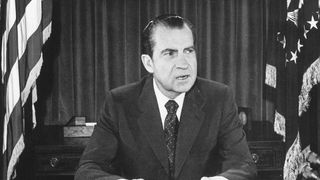US President Donald Trump's impeachment will pose no significant threat to his presidency.
Despite never being impeached, Richard Nixon nonetheless remains the sole example of an American president being forced from office by impeachment proceedings, a distinction that will likely remain uniquely Nixon's after any impeachment or trial of President Donald J Trump.
This says much about the current state of American politics and society. As one American friend put it, as the evidence for Trump's culpability has piled up, the political case against him has grown weaker.
How can this be?
While Nixon resigned, Trump will not
New polling by the United States Studies Centre reveals Americans to be sharply divided along partisan and ideological lines, not just in terms of approving of the President, but also on where they turn for news about politics, thereby reinforcing political predispositions and cementing support and opposition to President Trump instead of informing a consideration of the allegations against the President.
Similarities in the allegations between Trump and Nixon abound. At the time of the alleged wrong-doing, both Nixon and Trump were first-term, Republican presidents facing re-election.
In both cases, impeachment proceedings were instigated by a Democratic-controlled House of Representatives.
Both Nixon and Trump are alleged to have used the power of the presidency to illegally seek political advantage over likely Democratic opponents.

Both are alleged to have impeded Congressional investigations into those allegations, and the alleged obstruction has itself been the subject of a separate article of impeachment in both cases.
But while Nixon resigned, Trump will not.
Approval ratings are key
The US Constitution (Article 1, section 3) requires a two-thirds majority vote for a guilty verdict in a Senate trial.
Nixon resigned the presidency in the face of crumbling political support among Congressional Republicans.
Crucial to the fate of a president facing impeachment and Senate trial are their approval ratings among fellow partisans.
With audio evidence (the "smoking gun" tape) vividly demonstrating Nixon's direct involvement in the Watergate cover-up, Republican elder Barry Goldwater famously told Nixon that less than 15 Senators would vote to acquit him in a Senate trial. Nixon promptly resigned.
Crucial to the fate of a president facing impeachment and Senate trial are their approval ratings among fellow partisans.
In the post-New-Deal era, no president has ever confronted a Senate where the opposing party had a two-thirds majority.
Removal from office therefore requires at least some — if not many — of a president's own partisans to defect.
The President's political firewall
By late 1973, Nixon's in-party approval rating had dropped to below 60 per cent, reaching 50 per cent by the time the Judiciary Committee adopted articles of impeachment.
Bill Clinton could stare down impeachment and trial with an overall approval rating in the 70s in late 1998, and an approval rating in the high 80s among Democrats during his Senate trial.
No Democratic senator voted for Clinton's conviction on either of two articles of impeachment.
How is it that opinions about Nixon could change through 1973 and 1974 — even among fellow Republicans — but opinions about Trump have not?
Trump enjoys extremely high levels of approval from Republican identifiers, in the high 80s, as high a level of "in-party" approval seen at this stage of a presidency in the 70 years for which we have approval ratings.
This will be Trump's political firewall against impeachment.
How is it that opinions about Nixon could change through 1973 and 1974 — even among fellow Republicans — but opinions about Trump have not?
Major new analysis from the United States Studies Centre helps us understand why.
News consumption follows ideological lines
We find that patterns of news consumption in America closely follow partisan and ideological orientation, far more so than in Australia.
We surveyed 1,820 Americans and 1,800 Australians, assessing where they line up on a "left-right" scale based on their views about issues such as health care, the minimum wage, levels of taxation and government subsidies for the costs of higher education.
We then analysed where consumers of different news outlets tend to "clump" on this left-right scale.

In the United States, Fox News and AM radio attract a distinctly right-leaning audience, while The New York Times, The Washington Post, MSNBC and PBS and National Public Radio attract a distinctly left-of-centre audience.
Fox and MSNBC have unambiguous points of view with respect to Trump's impeachment in particular and American politics more generally.
Ultimately, the most politically engaged Americans tend to consume news from sources that reinforce views about Trump.
It's not 1974 anymore
Australians — and the Australian media landscape — looks far more homogenous.
We do see differences between Sky News viewers and Daily Telegraph readers on the one hand, and Guardian Australia and Crikey readers on the other.
But these differences are much smaller and less meaningful than the links between ideological leaning and news sources in the US.
In short, 2019 is not 1974, when Walter Cronkite and his peers could sonorously inform the large, bi-partisan audiences watching network news that Nixon was engaged in a criminal conspiracy.
That audience and those voices have largely vanished.
Absent exposure to information laying out President Trump's culpability, it's little wonder that Republican opinions are not changing, and little wonder Trump may not just survive impeachment, but thrive from it.
These findings are drawn from new polling released today: 'Public opinion in the age of Trump: The United States and Australia compared'.






